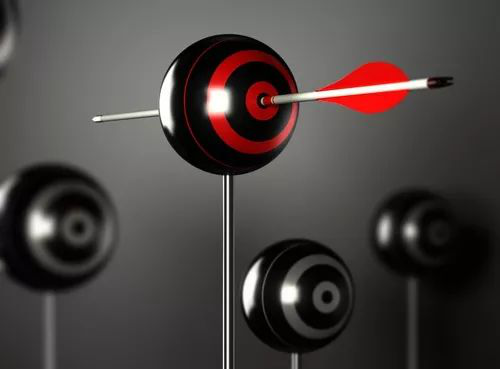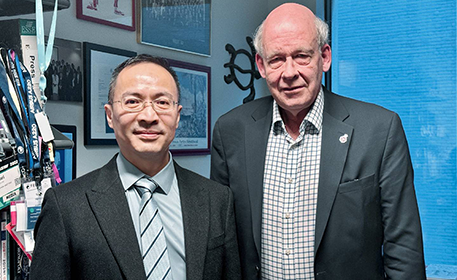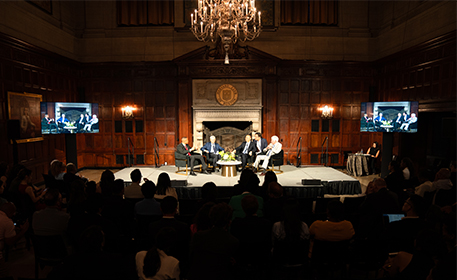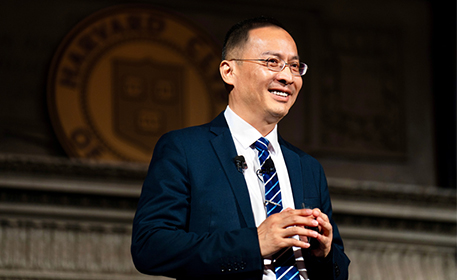
Interviewer: Liu Xuewei, deputy editor-in-Chief of Business Review.
"Most of the current predicament is due to our arrival at a knowledge-gap zone."
One afternoon in September 2018, Noah Xie, chairman of KMIND Strategic Consulting said in his office on the 69th floor of the Global Financial Center.
Outside the window are the high sky and fleeting clouds over Lujiazui. The autumn sunlight shone in forming a layer of gold plated on the half-meter-high statue of Guan Yunchang on the narrow table. With a stick of incense lighted, I began an interview with him, over a cup of tea.
I've known Noah Xie for a long time. At the end of each interview, I learnt something new, with some new emotions surging inside, or feelings of being injected with some new energy.
Throughout the interview, he reveals a kind of rational self-confidence in the path, system, culture, and theory surrounding China's commercial civilization. This confidence stems from a deep understanding of Western business management theory, as well as from the ancient land of the east, which he is deeply rooted in.
He had seen and experienced many kinds of bloodiness and perils in the business world, but you could not see the slightest signs of vicissitudes and gloom in his face. His smile was always so sincere and warm, and there was a glint of naivety that did not correspond to his age and identity.
Before the interview, I looked at the statue in his office and asked: why is it Guan Yunchang, not a Buddha or something else?
"Because Guan Gong is able to wield both the pen and the sword." Noah Xie said. As a warrior, he was highly skilled in martial arts; as a militarist, he was resourceful. He is an embodiment of benevolence, righteousness, reverence, wisdom, and faithfulness, a representative figure of Chinese culture. As a competition strategy consultant, we should continue to cultivate our excellent knowledge of competitive strategy. Do something meaningful in this world, instead of leaving this world accomplishing nothing. Act affectionately and righteously, but not get addicted to human feelings. Every day I see Guan Gong, I will remind myself this way, and will require the team to do so.
At that moment, I seemed to understand why the company, which had been in existence for less than four years, had become a dark horse in the consulting industry.
The following is an excerpt from the interview
Business review: By this year, China's reform and opening up has been going on for 40 years. Chinese enterprises have undergone lots of changes in brand concept and strategic planning. Can you give us an outline of the paths of change left in the development of Chinese brands and corporate strategies over the past 40 years?
Noah Xie: I should say that China's 40 years of reform and opening up is a microcosm of the century-old western market economy. We have completed their historical journey of a hundred years within just 40 years, which means that we have to endure more sharp turns and more drastic changes.
40 years can be roughly divided into three stages.
For the first stage, the product was the king.
As long as your product is good enough, as long as your cost is low enough, as long as your production efficiency is high enough, you can win the market.
There was a popular phrase called "Guangdong products conquering the North” at that time. Drinks like Jianlibao was from Guangdong; snack food like Carlsberg Biscuits was from Guangdong; apparel like jeans, bat shirts, and bodybuilding pants, as well as electrical appliances that ordinary folks longed for were all from Guangdong. Guangdong products occupied every part of our motherland.
That was at the beginning of China's reform and opening up, around the 80-90s of last century.
Then for the second stage, the channel was the king.
Whoever focuses on the channel, whoever focuses on the market, can win. At this time, the economic leading position of Pearl River Delta began to give way to the Yangtze River delta. The channel-based enterprise like Wahaha, began to grow rapidly.
A large number of new channels sprung up in China. Various forms of supermarkets mushroomed; nation-wide chain-stores began to emerge. This is the channel era. Whoever has the channel has the say, which explains why Zong Qinghou has stayed on top of China Rich List for years.
With the vicissitudes of times, comes the third stage, for which the brand is the king.
Whoever owns the brand wins. Some people say that the brand is the property rights of enterprises. In fact, only brands recognized by customers have value and can be called the property rights of enterprises.
Back to our ancient wisdom of China. The ancients said, "Whoever wins the hearts and minds of people wins the world." So, whoever wins the hearts of consumers will have the say over the market.
These three stages were completed in the West over a hundred years, while in China it is 40 years. Today's Chinese entrepreneurs feel that it is harder to make money now. You make more painstaking efforts at higher costs but make less money than before. It is mainly because the focus of the era has changed, which makes it hard for our previous successful experience to work today.
Therefore, entrepreneurs should understand the strategy and how to grasp the strategic focus of the enterprise. In the product era, if you seize production, you seize the strategic focus; in the channel era, if you can grasp the market, and get hold of the distribution network, then you seize the strategic focus; in our era today, if you can hold the attention of your customers, you seize the strategic focus.
Each of the three eras has its distinctive features and a different focus. Whoever can adapt to the changes can win the market. And those who can't keep up will be eliminated in the era. I think these traces of change in China's 40 years of reform and opening up really deserves our attention.

Business review: So what's the next? What do you think will be the trend for Chinese enterprises over the next stage in terms of brand concept and strategic planning? What should enterprises do in their business practice?
Noah Xie: Next is the continuation and deepening of the third phase. We can say that we have now entered an "era of great competition."
The development of management has brought about unprecedented improvement in the production efficiency of human beings. We can all see that nowadays, as long as there is a profit opportunity, regardless of which industry it is in, a lot of talents and capital will pour into it, enabling it to get hot quickly, become feverish, finally reaching the extent of overheated competition.
In such an era of great competition which needs red-badge of courage, whoever stands out becomes the winner.
To stand out, you should abide by the laws of this era. It is not enough to have just good products, technology, services, and experience. In addition, you need a better understanding of your customers who in turn should be allowed to have a better understanding of yourself.
You have to have a popular brand, focusing the operation of your entire business around the feelings of customers, with all business activities to ensure the strengthening of the feelings of customers, their understanding of the brand, and the uniqueness of the brand.
In the practice of enterprise management, enterprises should be well prepared for this era.
First of all, the focus of the entire enterprise KPI assessment should revolve around customer feelings and customer experience.
In the era of great competition, using turnover and profit as the focus of assessment has become outdated. The focus of your assessment should be customer acceptance of your brand, their experience, appraisal, and evaluation, are what you should value.
Secondly, the business operation should also revolve around the feeling of customers.Entrepreneurs themselves should have the corresponding thinking mode, ability and knowledge, which should be the strategic accomplishments of every entrepreneur in the great competition era.
In addition, enterprises should have the appropriate functions and architecture to accomplish these tasks.For example, are your product R&D department, manufacturing department, brand development department, customer service department and so on, designed and in service around the feeling of customers? Are their functions distinct?
You must be equipped with a full, reasonable and scientific budget for your strategy, including the budget and expenses for your business.

Business review: When it comes to companies preparing for the era of big competition, we have noticed some of the moves of big brands in recent years.
The first action is that they still continue purchasing small brands, like the French cosmetic giant Loréal which has acquired 33 big brands in 50 years, and in this year has brought one South Korea and two German makeup brands into its command;
The second move is mergers and acquisitions (M&A) between big brands, like Nestlé’s acquisition of Starbucks ' coffee retail business not long ago;
The third move is to withdraw from certain geographical markets, like Suzuki Motors and Carrefour Supermarkets, which are known to all of us. Both have announced their withdrawal from the Chinese market;
The fourth move is the acquisition of big foreign brands by some Chinese brands. A very representative example is Geely's acquisition of Volvo, in addition to Haier's acquisition of GE’s home appliances.
Do you think this is a preparation for the era of big competition? Why are some enterprises doing addition and others doing subtraction?
Noah Xie: These actions, whether M&A of Chinese brands, or vice versa, or even M&A among foreign brands, to a certain extent, reflect the strategic thinking and confusion among brand owners over the challenge of how to continuously obtain entrepreneurial competitiveness for the era of great competition.
To some extent, these practices do not mean to allow the brand to gain intrinsic competitiveness, but rather to sustain survival or development externally by M&A, or by evasion. So that the problem may be solved in the short term, but there is no solution to the problem of sustainable competitiveness. Their role is limited.
The real purpose of M&A should be synergy. I am in a market segment which is not competitive enough. Then I would like to merge or acquire a very strong brand in this field, in order to gain the leadership advantage in this market segment. This kind of M&A is OK. If the M&A is just due to evading the pains of having to compete with other peers, then such an M&A is passive without strategic insight or planning.
When it comes to addition and subtraction, let's take GE as an example. It does subtraction, having stripped off the financial, home appliances, medical and other industries, and now focusing on the aviation, electricity and renewable energy sectors, officially returning to the essence of an industrial company.
he power of a brand is inversely proportional to the number of products it represents. If the brand represents too many categories, its power will gradually weaken. GE focuses on a few categories, so its brand power will grow stronger.
In contrast, for the brands that are doing addition, I think they need to be looked at dialectically.
If a brand obtained by the company through M&A represents a category or leads the category, M&A is intended to enrich the product line, like Coca Cola’s acquisition of the coffee chain store Costa, which I am optimistic about if it keeps the brand of Costa.
But if a brand is acquired to enrich product category, and is placed under its own brand, like real estate companies which buy water plants and then use their own brands to make drinking water brands, then, I could consider such an M&A undesirable. The purpose of M&A is to acquire the right brand, not to acquire the right product.

Business review: For century-old stores, do you think they can continue to lead in the era of big competition, just by strategic M&A or some classic marketing techniques?
We have found an interesting phenomenon. There are now few "die-hard fans" among today’s youth of the 90s or 00s. It seems hard for them to have a long-term obsession with a big brand. It is easy for them to be fond of the new and tired of the old. And some of the popular online hot brands they hailed, seemed hard to be explained with past marketing or brand logic. How do you think of the fight for the heart and mind of a new generation of consumers among future enterprises?
Noah Xie: First of all, I think the youth of the 90s and 00s is not that mysterious, because human nature is relatively stable. From man’s birth on Earth, to the time it began to stand upright and walk, and up till now, the fundamental human nature has changed little.
This rule also applies to the youth of the 90s and 00s, in that their human nature hasn’t undergone dramatic change. What we see in their consumption preferences is the so-called intergenerational gap, which is only a superficial phenomenon, not a mutation in the laws of mind and the laws of consumption itself. Such judgment fails to see the essence as it is bewildered by the phenomenon.
As to the old brands. In today's era, many old brands, and even internationally renowned old brands are also facing some development bottlenecks. I think this is due to two reasons:
The first reason is that past effective knowledge systems are no longer applicable to today's competitive environment.
These old brands believe in the international 4A brand image theory. They adopt "established" management concepts and tools of some "established" consulting companies. Their most common misconception is the use of operations in place of strategies. The knowledge they use to build their brands and construct their corporate strategies has lagged far behind that of the era.
The second reason is that the effectiveness of the traditional media systems used has been reduced to some extent.
The habits of the youth of the 90s and 00s in accessing the media have changed. They have less contact with the traditional media which are brand media upon which the development of major international brands depend
The brand merchants' own knowledge system is outdated, and the brand recipients’ access habits have changed. These two reasons cause the acceptance level of many major brands to plummet sharply among the youth of the 90s and 00s.
It is not that human nature has changed, but that the time has changed. With the change in the competitive situation, brand understanding has not kept up.
This gap may be exactly an opportunity for Chinese brands. Although western companies have been successful by the useful knowledge of the past era, in the new era, the knowledge is out of date.
Many western companies are still inextricably mired in it, but our Chinese companies do not have that "burden of knowledge." So, we can accept new knowledge more easily, getting armed with our brand and corporate strategy in the new era. Isn’t this an opportunity for Chinese enterprises?
Business Review: The new generation of competition strategy and knowledge system developed by KMIND is also combined with Michael Porter’s theory of competition strategy, Reese and Trout's concept of positioning, and Drucker’s series of management ideas. Don’t they all belong to the old knowledge?
There are also strategic components. Assuming they were some kinds of tactics, several masters elaborated on them many years ago in different ways. Then, as you call them new knowledge and new tactics, then in what way are they “new”?
Noah Xie: The new knowledge and new tactics refer to the knowledge from combining all of the above, which existed separately before but now linked without walls between them.
KMIND’s Competitive Strategy Consulting System was established by combining the oriental wisdom of " Tao Te Ching," Confucian thought, and the systematic view of Military Science of Sun Zi, with some excellent theories of the West for competition strategy, positioning and management, enriching the analytical and subject-based way of thinking in the West.
Western-style thinking is analytical, result-oriented, and fragmented, but in "Military Science of Sun Zi ", thinking is systematic, panoramic, and intuitive.

Business review: Sounds a bit like cooking. The Western food contains some very nice and nutritious ingredients, with regional differences in the formula for dishes. But it doesn’t seem quite meeting the taste of the Chinese people, nor the Chinese stomach. KMIND Consulting put these ingredients together with Chinese ingredients for renewed study, attempting to use Chinese cooking methods and food breeding concepts to make food for the Chinese.
Raw materials are the same; Recipes and cooking methods are different; and cooking technology has also changed. Fire temperature manipulation is Chinese characteristics. A new dish is made! Is this the right metaphor?
Noah Xie: Yes. Whether you can win in the era of great competition depends on the ability of entrepreneurs to cope with competition. In the era when products supply doesn’t meet demand, consumers do not have a say. Entrepreneurs’ words mean everything. You own the market if you can create products.
China then replied on coupons for making purchases. You dared not tell me not to buy. I won’t necessarily sell you even if you have money. You need to have coupons. Then with oversupply came the era of severe excess. The consumer is the one who calls the shots, as he can choose not to buy this cup, but buy one elsewhere. Enterprises must compete with many of their peers to win the customers.
The United States entered this era earlier than we did, in which Professor Michael Porter took the lead in leading the development of competition theory, so people revered him as the "father of competitive strategy."
He set up a framework for the discipline, believing that differentiation is the strategy, cost leadership is the strategy. But on the reality level, there is more need for dynamic adjustment and response. It is not a static view.
Jack Trout and Al Riss tell us that differentiation exists in the mind, not in the product, the channel, and the crowd. It is only by combining the interpretation of the two that a complete theoretical framework is formed
But the framework alone is not enough. A purpose is needed. Or we get no results, i.e., the corporate success. Westerners are accustomed to analytical thinking, which is localized thinking. And helping enterprises to get results can’t be achieved just by an advertising message, nor is it enough to just help enterprises during a certain procedure. It must be systematic thinking.
It’s just by using Western sciences, coupled with China's intelligent way of thinking that KMIND Consulting constructed its competitive strategy consulting system.
Business review: I noticed that this is a continuous evolving and iterative process, so what will be the next development?
Noah Xie: As a strategic consulting company of the new era, we deeply appreciate that "customer achievements" are the key we pursue, and so we must take the initiative to explore some open multiple propositions.
What is particularly important here is the use of Chinese cultures, such as S Military Science of Sun Zi, which provides a lot of systematic thinking and strategic and tactical wisdom for enterprises about how to win commercial warfare.
KMIND’s consulting team made some innovations using core theories as for the backbone, introducing systematic and standardized improvement on the non-standard products in the previous Chinese style consulting whose services are based on whims, forming into a consulting system.
The whole consulting process can be divided into several stages, each stage having the corresponding control standards, and operating procedures, which are all documented in text, becoming textbook for staff training, and forming the basis of staff evaluation and assessment for promotion.
After the formation of this standardized operation, the consulting effect has been greatly improved. KMIND Consulting no longer acts like before relying on individual abilities to serve enterprises, but is increasingly depending on the systematic operations of its teams to provide services to enterprises.
In addition, we also pay attention to the transmission and transformation of knowledge. In the service of any business, there will be a lot of innovation and knowledge output. These used to be in kept in the mind of individuals who take them away when he leaves.
Now that a system is in place, all innovations and knowledge outputs can be classified and gathered in a timely manner, thus avoiding the loss of knowledge resulting from that of brain. The system also provides a basis for the training, promotion, and assessment of newcomers, helping newcomers to the company quickly upgrade their professional skills.
We will continue to innovate based on this system in the future. We are now preparing to integrate them with OA and IT systems, connecting our system with customers’ strategic operating system. As it is open, with its own learning power, so its content will continue to accumulate and get enriched. We will continue to upgrade it.

Business Review: In microscopic terms, competitive strategy systems can help companies win. At the macro level, it is an indisputable fact that export enterprises have been affected in 2018. What do you think of the challenge that the state is now proposing to expand domestic demand, but the disposable income of the common people and the income the common people can dispose are limited?
Noah Xie: First of all, be optimistic. We are hopelessly optimistic. The reason why we are willing to be " hopelessly optimists" is that these issues can be solved.
In a changing environment, enterprises have a hard time. An important reason for this, I think, is that many companies have not yet found a way to deal with competition effectively, be it in the east or in the west.
In the era of great competition, enterprises are more trapped in the bloody sea of price wars. How to rise from the flames? How to continue to achieve the strong force of growth? Very few people know the knacks, for lack of theoretical knowledge, and lack of practical knowledge such as effective implementation methods and so on in a serious manner.
And our work is to help companies quickly break away from this knowledge gap zone and help them evade the threat of competition just through transmission of knowledge. Looking at the customers we have served, all showing desirable growth momentum. So how, do you think, can we not be optimistic?
Business Review: Do you think the supply-side structural reforms proposed by the state in recent years are a useful practice? What role does KMIND's competitive strategy play in supply-side structural reform?
Noah Xie: First, need to see why there are supply-side structural reforms? It is because of overcapacity. If the problem of overcapacity is not solved, the supply-side structural reform will never end. So we should fundamentally solve the problem of overcapacity.
Why overcapacity? Homogenization competition caused by the knowledge gap zone is one of the main reasons.
Why, when there already is a lot of capacity in this area, does so much capacity keep pouring in? Such obvious irrational behavior is repeated in so many industries, which is the result of lack of knowledge. Embodied specifically in two areas:
First, if I have the preemptive advantage in this field, my production capacity ranks first in the industry. I am the leading brand in the industry. Then, how can I keep the results, effectively resisting large-scale investment in my area from other people and preventing their follow-up, so that opponents dare not exert their influence in my field?
Others entering your field, indicates that the preemptor does not know how to defend, causing the entire industry to be opened, and a variety of production capacities flocking into the industry turning it into the Red Sea.
In fact, those anti-resistance methods can be fully learned in the "Military Science of Sun Zi ". The pioneers and leaders of any industry should have the strategic accomplishment of "beating the enemy without fighting” and know how to effectively build industrial fortifications. If you don’t do this, you will change from "a pioneer" to "a martyr."
Second, the new participants also lack a certain degree of strategic literacy, not knowing how to carry out effective industrial deployment, so they choose the follower strategy, following up the industry's hot spots for repeated investment.
And the right approach should be to avoid homogenization competition with the industry leader. You can use the competition strategy to develop a new strategic direction, to create a new point of appeal, and to lead the development of a differentiated brand through the new strategic direction.Thus, your own capacity will not squeeze out each other with the previous capacities. And all of this requires new knowledge.
You can say that not knowing how to avoid homogenization leads to overcapacity. In the final analysis, for the issue of supply-side structural reform to be solved from the root, it is necessary to solve the knowledge gap zone. Without entrepreneurs making up for their lack of knowledge in this area, the problem of overcapacity may not be solved, and the supply-side structural reform will remain the "main rhythm."
The knowledge of competitive strategy can lead the enterprise to the road of differentiation avoiding a bloody slaughter. You have your advantage, and I have mine; you have your market, and I have mine. Enterprises seek co-existence and co-prosperity with each other because of their differences.
We say "harmony among heterogeneous gentlemen." The so-called "harmony" must mean a harmonious relationship because of our differences. We also say that "discord among homogeneous villains." Today's corporate society is more like "villainous society," where all deal with the same products but result in discord.
Therefore, for the supply-side structural reform, a sentence from Chairman Mao's poem can be a good summary. "All forms of life compete to live freely in the autumn light". And one of the important things we KMIND do is helping entrepreneurs get out of this knowledge gap zone quickly.
For example, we help Feihe to find their own differentiated competition strategy, to work on the "milk powder more suitable for the Chinese baby”, winning customer recognition because of this. Our knowledge guidance for the enterprise helped get it out of the homogenization competition and achieve counterattack against hopeless situations.

Business Review: Now the state advocates four kinds of self-confidence, i.e., self-confidence in the socialist path with Chinese characteristics, theoretical self-confidence, institutional self-confidence, and cultural self-confidence. In your opinion, what is the guiding significance of these four types of self-confidence to the brand shaping and competitive strategic patterning of our Chinese enterprises?
Noah Xie: First of all, I think a lot of Chinese companies still lack self-confidence at the moment. In the past, the Chinese held foreigners in high esteem, and trumpeted servility to anything from exotic land, so even westerners look down on those with such mindset and value.
Back to China's self-confidence, I would like to dwell upon it from several perspectives:
First, the Chinese market.
I believe it must be the Chinese people who understand the Chinese market better. A sense of familiarity with culture can be formed through a long-term imperceptible edification. Westerners, no matter how long they stay in the Chinese market, may not match Chinese in terms of operating the Chinese market. This is the first confidence that Chinese businessmen should have-cultural self-confidence
Second, the Chinese way of thinking.
There is an essential difference between Chinese thinking and Western thinking. Chinese are intuitive but also holistic in thinking; Westerners are more analytical and inferential in thinking. Each has its own merits, each adding radiance to the other. They have their own strengths, and we have our own too. We shouldn’t just focus on our drawbacks. We need to see what's unique in us.
TCM is just a product of Chinese thinking. In the past, it’s not recognized by people, especially Westerners, as it is unclear about pathology. Now we see that TCM is increasingly integrated into the concept and method of evidence-based medicine, and began to apply evidence-based medicine to establish and improve the clinical evaluation system of TCM, which opens a door for the modernization and internationalization of TCM.
Third, Chinese culture.
The Chinese culture conceived by the Chinese way of thinking has its uniqueness, about which we should be knowledgeable. We should also have full confidence in its advantages. On the basis of a correct understanding, we should absorb the strengths of Westerners in a manner that is neither haughty nor humble, getting better than them this way, as is expressed in the phrase called ”learning from them to beat them."
In terms of drawing knowledge from the outside, it should be said that today's Chinese have done a better job, and are more humble and more open. So, we see that the Chinese are making faster progress.
Fourth, Chinese decision-making.
We can see that when we read the history books, the Chinese are more determined and show better judgment when they are without fully mature military theories and strategies while in the field of actual combats throughout the history of the world,
When Westerners are puzzled by something, they have no motivation for action. But the Chinese act on what they think about like crossing a river by feeling the stones. At a time when the theory is not ripe yet, the Chinese run fast. Because the Chinese are practical and rational, so they learn anything that works for them.
Westerners ' theories are really rigorous and logical, but they can also bring people into a dead end. But Chinese people won't do that, and they won't be chained up by theory.
If you tell the Chinese one thing and he will say, it is a good story, but seeing is believing, and I will believe you with my own eyes. The Chinese believe what he can see, so they won't go into the dead end of the theory.
In addition,I think Chinese enterprises should have their own characteristics in management, a.k.a. self-confidence in management. We should make corresponding improvements to the Western management system, and integrate into the Chinese culture so as to manage the Chinese team.
At the same time, in the era of homogenous competition, the issues of Chinese enterprises arising against the complex environment cannot be solved simply by relying on Western competition strategy, marketing or advertising principles. We have to believe that we can be innovative in this respect, creating a breakthrough along the path carved by ourselves.
Business Review: You said that no matter how time and space changes, the deepest aspects of human nature are eternally the same. In your opinion, what are the deepest aspects? How does this help the development of the KMIND team?
Noah Xie: I would like to regard it as the human instinct, which is forever immutable. For example, man wants to eat, sleep, and socialize. Man has love and hate, Man has a sense of insecurity. Therefore, a good strategy must be based on human instincts, and then inspire the noble side of human nature, so that human nature can be plump and uplifting.
Stimulating human nature towards benevolence, which is the essence of the competitive strategy. Simple operation management cannot exercise this function.If you want to lead an organization to advance further, you must inspire human nature towards benevolence, which needs the motivation of the strategy, i.e., the purpose of your business.
For the KMIND team, its service is theoretically inclusive, and customer-first in real-world operations, organizationally providing platforms for personalized service, which are the three magic weapons of KMIND Consulting.
The platform has the copying function which is infinite, providing continuation of the life of the individual; individual is not, as the individual is unique, priceless, and finite. Therefore, of course, we have to serve things which are finite with things that are infinite.
Every KMIND staff knows that the company will be responsible for him. In KMIND Consulting, employees don’t work for the boss, but the platform provides service for individuals. I am also an individual, so the platform offers service to me.
We select the elite, bring a sense of achievement to them, and help them acquire top professional skills, forge a strong psychological quality, and finally achieve spiritual and monetary success.

Business Review: Everyone knows you're a reading fanatic, what book have you been reading lately?
Noah Xie: I read two kinds of books: the first is classics for lifelong reading which I read all the time, like Drucker management series, Trout's positioning series, and Li Zehou's aesthetic series. I've been reading these three series for more than 10 years, and each one has been read dozens of times or even hundreds of times. And I'll continue reading them, because I often gain new insights from reading.
The second is books I read interspersed throughout my reading of the first category, like biographies of Zeng Guofan and Su Dongpo, all of whom have a profound impact on me.
Business Review: I understand that you read Zeng Guofan's biography, but why are you interested in Su Dongpo? What does he have to do with competition strategy?
Noah Xie: Su Dongpo is a great writer, who represents the peak of the spirit of Chinese scholars-bureaucrats. He is an idealist, possessing both virtues of fortitude and diligence of Confucianism, as well as purity and seclusion of Buddhism and Taoism.
"Don’t listen if the rain does the leaves sway; it’s better to walk lightly singing a lay. Sandals outdo saddles, cane as your aid, who’s afraid? A cape against mist and rain, come what may.
A spring wind blows me sober, blows away. A chill day. The sun uphill slants to me with a ray, I turn around and feel a gentle sough, go back now. No wind, no rain, nor shining light to stay."
"This is one of my favorite poems by Su Dongpo. The first stanza shows the determination of the young man to forge ahead with a strong independent will. We feel his courage, his broad mind and ambition; the second stanza expresses the maturity and serenity of a person who had experienced depression and tribulation after sufferings.
To manage a business well, we should dare to do everything with determination. But in our mind, we need to have the courage to face setbacks, difficulties, and failures.






